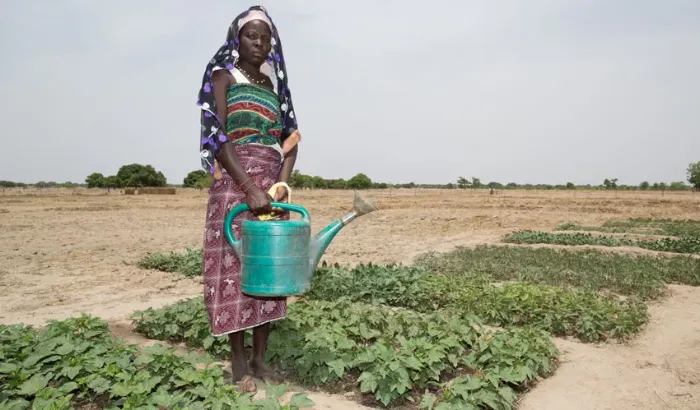Blog Post

The Intersection of Climate Change, Food Security, and Environmental Sustainability in Africa
3 min read Article by Musa Moshood Olawale | Environmental Professional
Musa Moshood Olawale | Environmental Professional
Photo Credit: Self Help Africa
INTRODUCTION
For many years, the main topic of discussion in international policy has been how climate change affects economic growth (Chauhan et al., 2020). One of humanity's biggest difficulties in the coming decades will be to meet the food needs of an expanding population while preserving the environment and using limited resources (Barrera and Hertel, 2024). The demand for food will continue to rise for at least another 40 years due to current population trends and consumption patterns (Godfray et al., 2010). The stability of global food systems is threatened by a number of climate change-related effects, which also expose vulnerable populations to various types of malnutrition and reduce food security and diet quality (Owino et al., 2022).
The effects of climate change on crop yields and food production, soil fertility, rain patterns, food-nutrient and anti-nutrient composition, and nutrient bioavailability exacerbate unsustainable food systems (Iqbal et al., 2024). Furthermore, these changes have reduced the amount of macro- and micronutrients in the world's food supply, while indirect effects, such as pests, increase the risk of food spoiling and food safety at various stages of the food chain, from primary production to post-harvest storage to consumption.
This article explores the intersection between food, climate and environment in Africa by integrating sustainable action plan for the future in Africa.
Climate change and food waste
Food loss and waste have a substantial greenhouse gas (GHG) footprint, which further exacerbates the climate change crisis (USEPA, 2021). Significant amounts of carbon dioxide (CO2) are released during the production, handling, and transportation of food. Methane, an even more potent greenhouse gas, is also released when food waste ends up in landfills. There is growing recognition of the connection between climate change and supply chain resilience and agriculture, as well as the connection between climate change and food loss and waste (FAO and USEPA, 2021). The impact of extreme weather events on supply chain resilience and agriculture is becoming apparent.
Climate change and biodiversity loss
Approximately 26% of livestock breeds are at the risk of extinction. FAO, (2019) report showed that about 24% of wild food species is declining, and 61% of them are unknown or unreported. Due to habitat destruction (i.e., urbanization, shifting agricultural practices, deforestation, desertification and industrialization), global warming, and the unchecked spread of invasive species, biodiversity—including the diversity of genes, species, and ecosystems—has drastically decreased recently (Owino et al., 2022). Pollution, nitrogen deposition, and changes in precipitation has also contributed greatly to the loss of biodiversity (Cramer et al., 2017).
Food Crisis in Sub Sahara Africa
As part of its Sustainable Development Goals (SDG) agenda, the United Nations (UN) declared in September 2015 that it would cut global food loss by a significant amount and cut food waste in half by 2030 (Sheahan and Barrett, 2017). food availability remains a significant concern due to the continent's increasing rates of poverty and population expansion. According to recent estimates, the situation in Africa is particularly growing, as severe food insecurity affected 21.5% of the population in 2018 and increased from 210.7 million to 277 million between 2014 and 2018 (FAO et al., 2019). The figure 1.0 describes the food insecurity crisis in Africa. As at 2018, Southern Africa had the highest prevalence of severe food insecurity 37%, followed by Eastern Africa 32%, Western Africa 21%, and Northern Africa 10%. This shows that food crisis will even be more severe in the future.
| Figure 1: Africa food insecurity increase in 2018 (FAO et al., 2019) |
Greenhouse Emission (a by-product of Food waste)
In the rural areas of Sub-Saharan Africa where populations depend largely on food production for their income and most often the problem of food waste is attributable with poor harvest and storage process practices. Nearly 30% of greenhouse gas emissions worldwide come from agriculture, and the fertilizers and pesticides used to produce our food are mostly to blame for pollution and environmental damage. Foods that are poorly processed and thrown out to the environment produces some gases such as methane. These gases find its way into the atmosphere thereby contributing to the carbon footprint already in the environment.
Sustainable Agriculture Practices for A Resilient Food System in Africa
Many rural areas of sub-Saharan Africa still rely on sustainable agricultural practices (SAPs) as the answer to problems with low rainfall, climate change, and low agricultural productivity. Practises such as cover cropping, crop rotation, conservation tillage and intercropping haven proven to be boost crop yield and protect the environment (Sithole and Olorunfemi, 2024). The study of Oni (2009) showed how smallholder farmers are adopting sustainable practices as conservation agriculture due to financial constraints and inability to prioritize innovative conventional methods. Similar report was observed in Ghana, about 40% of farmers have considered improved seed variety (Danso-Abbeam et al., 2017) and mixed farming.
Food Waste Reduction Strategies for a Climate Friendly Future
It is crucial to develop effective strategies to reduce food waste, ensuring economic sustainability and mitigating the impacts of climate change (Carpio-Aguilar et al., 2019). Composting, incineration, usage as animal feed, conversion to fertilizer, anaerobic digestion and landfilling are the classical methods to manage food waste (Sarkar et al., 2021). Although in recent time, the agro-allied industries integrated food waste into biorefinery products such as biofuels, organic acids and biochemicals which is a better sustainable alternative to the traditional food waste landfill (Bhatia et al., 2023; Rathore, S. and Pandey, 2020).
Conclusion
The interplay of climate change, food security, and environmental sustainability presents a pressing challenge for Africa. The impact of climate change on agricultural productivity, biodiversity loss, increasing frequency of extreme weather events, soil degradation and food waste exacerbates food insecurity, particularly in Sub-Saharan Africa. To address these challenges, sustainable agricultural practices, improved food storage and processing techniques, and policies that enhance food security must be prioritized. Proper management of food waste can efficiently curtail the emission of greenhouses. Collaborative efforts between governments, researchers, and stakeholders are essential to developing effective strategies that mitigate climate change while ensuring food security for Africa’s growing population.
REFERENCES
Barrera, E.L. and Hertel, T., 2021. Global food waste across the income spectrum: Implications for food prices, production and resource use. Food Policy, 98, p.101874.
Bhatia, L., Jha, H., Sarkar, T. and Sarangi, P.K., 2023. Food waste utilization for reducing carbon footprints towards sustainable and cleaner environment: a review. International journal of environmental research and public health, 20(3), p.2318.
Carpio-Aguilar, J.C., Rincón-Moreno, J. and Franco-García, M.L., 2019. Potential of carbon footprint reduction within retailers: food waste at Walmart in Mexico. Sustainable Development Goals and Sustainable Supply Chains in the Post-global Economy, pp.225-240.
Chauhan, N., Shukla, R. and Joshi, P.K., 2020. Assessing inherent vulnerability of farming communities across different biogeographical zones in Himachal Pradesh, India. Environmental Development, 33, p.100506.
Cramer, W., Egea, E., Fischer, J., Lux, A., Salles, J.M., Settele, J. and Tichit, M., 2017. Biodiversity and food security: from trade-offs to synergies. Regional Environmental Change, 17, pp.1257-1259.
Danso-Abbeam, G., Bosiako, J.A., Ehiakpor, D.S. and Mabe, F.N., 2017. Adoption of improved maize variety among farm households in the northern region of Ghana. Cogent Economics & Finance, 5(1), p.1416896.
Godfray, H.C.J., Beddington, J.R., Crute, I.R., Haddad, L., Lawrence, D., Muir, J.F., Pretty, J., Robinson, S., Thomas, S.M. and Toulmin, C., 2010. Food security: the challenge of feeding 9 billion people. science, 327(5967), pp.812-818.
Author:
 Musa Moshood Olawale | Environmental Professional
Musa Moshood Olawale | Environmental Professional
Musa Moshood Olawale is a highly skilled and versatile environmental professional with extensive experience in research, laboratory work, environmental management, and public health. He holds an MSc. in Environmental Management and Protection and a BSc. in Environmental Management and Toxicology from the Federal University of Agriculture, Abeokuta.
With a strong background in policy formulation, public sensitization, and environmental law, Musa has worked in various capacities, including as an adjunct lecturer, research technician, and research assistant. He has expertise in laboratory techniques, microbial analysis, quality control, and data analysis.
Musa is passionate about contributing to sustainable development and public health initiatives through meticulous research, effective communication, and community engagement.
Comment(s)